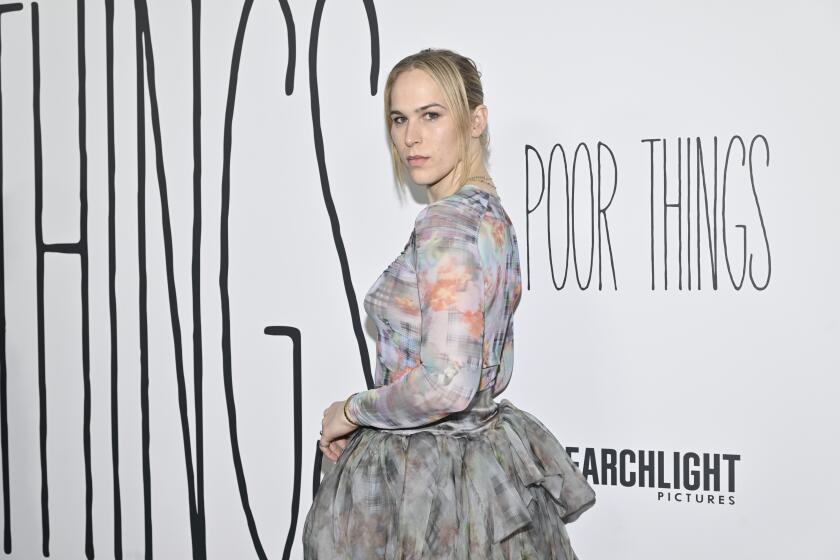‘Mad Men’ recap: Goodbye to Shangri-La
Joan, go ahead and burn the place down. I won’t judge.
Not that I’m advocating arson, per se, but I don’t know if I’ve ever felt such vicarious rage for a “Mad Men” character as I did while watching “Lost Horizon” -- and still do as I write this some hours later. For a show rife with sexist, classist and racist behavior, that’s truly saying something.
And not that our favorite redhead isn’t, by now, used to a bit of heartbreak. After all, this is a woman who married a guy who raped her, slept with a sleazy Jaguar executive to secure a partnership she already deserved and gave birth to a baby secretly fathered by her ex after lying to him about having an abortion. Sure, it was bound to be a little bumpy for Joan at McCann-Erickson, but it’s always been a little bumpy for her. I figured, now that she’s financially secure and paired off with a (seemingly) nice guy, the worst was truly behind her.
Oh, how wrong I was.
Joan isn’t exactly thrilled about the move to McCann, but frankly even she seems shocked by how swiftly things go awry. An early visit from Karen and Libby, two female copywriters, perhaps lulls her into a false sense of security. Sure, their clients are Tampax and the pill (“If it’s in it, near it or makes you think about it, we’re on it,” one of them explains), but hey, at least they’re not secretaries!
Watching the scene a second time, though, their eagerness actually reads as desperation. “We’d love to share the crumbs with her,” says the one with the short hair, referring to Peggy’s accounts. She might as well have added, “No, seriously. We’re starving here.” They invite Joan to drinks with other female employees, quickly dismissing the idea that it’s any kind of “women’s lib” gathering, “just a bitch session.” Their behavior is typical of women in the workplace -- they try to be as nonthreatening and self-deprecating as possible, making sure to soften anything that might be deemed aggressive by veiling it in jokes and niceties.
Soon enough it becomes clear why Karen and Libby are so eager to make allies. Joan takes her grievance with Dennis up the ranks at McCann-Erickson and at each step is met with appalling chauvinism: Ferg Donnelly demands she sleep with him, while Jim Hobart dismisses her accomplishments at SC&P and threatens legal action if she doesn’t make nice. Adding to the poignance of it all is that Joan is so apologetic -- again, so stereotypically female -- in her voicing complaints. She qualifies her complaints by telling Ferg that she likes Dennis personally, which we all know is a lie. Can you imagine Roger telling someone, “I like Harry Crane personally, but I’m not sure the client responded personally”? (No, you can’t.)
The entire incident plays like a horrifying flashback to “The Other Woman,” but it’s actually worse this time around because she walks away with only her Rolodex and a quarter-million dollars. Most disappointing of all is Roger, who once again disappoints by urging Joan to accept the buyout. “Don’t hide behind politics,” he says. “Take the money and be done with them.” The irony is that Joan isn’t a remotely political person -- or at least she wasn’t until she found herself in this position. The only thing that makes her fight political is the fact that she’s a woman; after all, Roger would do the same thing if he were in the same position. Nor is money Joan’s primary concern. More than anything, she wants to preserve what Hobart snidely calls her “little stake” -- the accounts she fought like hell to make her own.
As “Mad Men” winds down to a finish, its once-stealth feminism is becoming more and more overt. Last week there was Peggy’s instant-classic “Just like a man does” speech, and in “Lost Horizon” we are treated to a confrontation between Joan and Hobart that plays like feminist fan fiction (and I mean that in the best way possible). Joan threatens to file a complaint with the Equal Employment Opportunity Commission: “I’ll have the ACLU in my office, and Betty Friedan in the lobby with half the women who marched down Fifth Avenue.”
Matthew Weiner has said that Joan was inspired by Helen Gurley Brown’s “Sex and the Single Girl,” which makes her name-dropping of Friedan all the more revolutionary and her willingness to burn the place down (metaphorically speaking) all the more thrilling. It’s a beautiful and inspiring moment that felt about a decade overdue, which is why Joan’s ultimate capitulation is so heartbreaking. Again, as with “The Other Woman,” I feel disappointed by Joan’s decision even as I understand it completely.
In a sign of just how bad things are for Joan, she practically burst into tears of joy when she sees Don in the elevator -- Don, the guy she’s barely spoken to for a few years now. The great irony in all of this is that SC&P was hardly a bastion of gender equality. But if nothing else it was the devil that Joan knew, and small enough that she could (and did) make herself indispensable. At a giant conglomerate like McCann, she never stood a chance. This episode takes its name from a novel (turned into a movie directed by Frank Capra) about an idyllic place called Shangri-La. Joan realizes that SC&P was, though far from perfect, a safe place for her ambitions.
Joan’s fate does not bode particularly well for Peggy, who spends “Lost Horizon” in a strange, if deeply entertaining, state of limbo as she refuses to go to McCann until a suitable office is prepared. As she is wont to do, Peggy deals with the sexist treatment by acting with an almost delusional level of professionalism -- i.e. getting dressed up to go into the SC&P office even though it looks like it’s been ransacked by burglars, and forcing Ed to come up with work for Dow even though they’re no longer a client.
In one of the wonderful after-hours office encounters “Mad Men” has always done so well, Peggy and Roger get tanked on vermouth, drunkenly share their anxieties about joining McCann and show off heretofore unknown talents for roller-skating and organ-playing (respectively). It’s perfectly obvious why Peggy is worried: She’s a woman. But as a wealthy white man of a certain age -- and not, say, a young black woman like Shirley -- Roger shouldn’t feel so threatened by McCann. But as Peggy points out, he wants an audience, and for decades the agency has been his stage. At McCann, in contrast, he’s just going to feel old.
Peggy reminds him that SC&P was, well, not exactly Shangri-La. “It just looks good now,” she says, “but it was miserable while you were in it.” In turn, Roger teaches her that as a woman, she doesn’t need to make men feel at ease. The next morning, a (presumably very hungover) Peggy shows up at McCann, clutching a cigarette between her lips and Bert’s erotic artwork under arm.
This episode also finds Don chasing the illusion of perfection, driving all night to Racine, Wisc., in search of Diana. While we’ve seen Don’s disappearing act many, many times before, this is easily the most stalker-ish move he’s ever made. Frankly, I’m not sure I really get the Diana infatuation, but on the bright side, we get a visit from the Jack Kerouac-quoting ghost of Bert Cooper.
So what compels Don to take this spontaneous road trip? Could it be the crushing loneliness of his privileged yet empty life? Or the feeling that, no matter how special Jim Hobart has made him feel (“You’re my white whale,” etc.), he is now just a cog in a massive corporation where executives are like so many boxed roast-beef lunches? Or the gnawing sense that his dippy secretary Meredith is the only person concerned with his well-being on a day-to-day basis?
It’s also, of course, that Diana reminds Don of himself. “She’s a tornado, just leaving a trail of broken bodies behind her,” says her ex-husband, who sees right through Don’s ludicrous “fridge full of beer” story. Hmmm, sound like anyone you know?
I confess that I don’t find Don’s story line in “Lost Horizon” anywhere near as sympathetic or compelling as Joan’s, but I’m not sure I’m supposed to. There is a glaring and, I think, quite intentional contrast between Don and Joan’s behavior in this episode: He waltzes out of a meeting and drives halfway across the country without leaving word about his whereabouts, and yet his job remains secure; she is a model of professionalism and has the audacity to expect the same of her male colleagues, and is practically burned at the stake for it.
Oh, Joan. Where is a vase when you need one?
Stray thoughts:
--I spotted several allusions in this episode to “Mad Men’s” opening credits: Don surveilling the skyline outside his new office, then checking to see if the window opens as the wind howls outside; Roger talking about the two-story jump off his Navy ship.
--“Lost Horizon” may be “Mad Men’s” most GIF-able episode ever: Peggy on roller skates, Roger on the organ, Peggy and the cigarette...
--Mackenzie Astin, of “Facts of Life” fame, plays Diana’s ex-husband. “Mad Men” has cast more and more familiar faces in guest roles its later seasons. (See also: Devon Gummersall from “My So-Called Life,” Neve Campbell from “Party of Five,” Alexis Bledel from “Gilmore Girls”). I don’t know what the significance is, if any, but it can be distracting!
--Betty is reading “Dora: An Analysis of a Case Study of Hysteria,” which is about a young woman who has (literally) lost her voice. Symbolism duly noted.
--Speaking of Betty, in the teaser for next week’s episode, Henry yells, “Stop brushing your hair.” It’s possibly the most ridiculously oblique “on the next ‘Mad Men’” clip of all time.
--Another “Mad Men” mystery that will probably never be solved: Who is Roberta?
--Meredith is an ace interior decorator; maybe she can get her own home makeover show on HGTV? Please?
--A sign that Peggy’s secretary days are long gone: She can’t even make a cup of coffee without burning her hand.
--Here’s a story about the lawsuit Joan refers to in which employees at Newsweek and other media outlets sued over gender discrimination in the workplace.
--Don suggests Betty get a freshman to carry her textbooks for her, unaware of her icky flirtation with Glen. Don’t give her any ideas, Don!
--Peggy: “What is this?” Roger: “It’s an octopus pleasuring a lady.”
Follow @MeredithBlake on Twitter
More to Read
The complete guide to home viewing
Get Screen Gab for everything about the TV shows and streaming movies everyone’s talking about.
You may occasionally receive promotional content from the Los Angeles Times.






